In this article:
A very common issue has been floating around for time unknown – hair loss!

While hair loss can have thousands of causes from genetic makeup, improper diet, pregnancy, hormonal disbalance, and even stress, (1) one of the most common yet unknown causes is thyroid disorder.
Hair loss can happen due to thyroid problems such as hypothyroidism (not enough thyroid hormone) or hyperthyroidism (too much thyroid hormone).
This is because the thyroid hormone is responsible for healthy hair growth and hair follicle development. So, any problem with thyroid hormones leads to hair loss in the scalp, eyebrows, and other parts of the body. (2)
In people who suffer from hypothyroidism, the hair grows very slowly and tends to be drier and coarser. Researchers suggest that treatment of the underlying thyroid issue can, in some cases, undo hair loss. (2)
This article looks into the potential usefulness of some vitamins in mitigating thyroid-related hair loss. It also discusses the significance of adequate nutrient intake by evaluating the function of vitamins.
Vitamins That Can Help with Thyroid-Related Hair Loss
Vitamins have a very important function in managing your overall health, and their effect on hair health, mainly in patients with thyroid-related hair loss, has garnered a lot of attention.
Here are some vitamins that have been linked with potential benefits in the control of hair loss triggered by thyroid issues.
1. Vitamin D
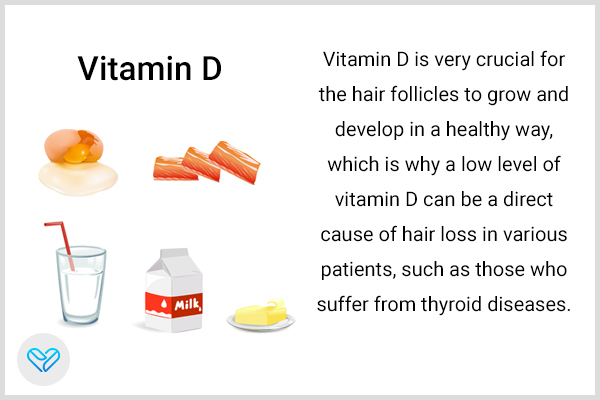
Vitamin D is very crucial for the hair follicles to grow and develop in a healthy way, which is why a low level of vitamin D can be a direct cause of hair loss in various patients, such as those who suffer from thyroid diseases. (3)
Vitamin D interacts with specific cells in the hair called “keratinocytes” through something called a vitamin D receptor, which contributes to the growth of your hair.
Research conducted on hair cells in mice found that, during periods of active hair growth known as the anagen stage, these vitamin D receptors are highly active. (4)
So, if you suffer from a thyroid disorder, get your vitamin D levels checked, and on the doctor’s advice, you can start taking vitamin D supplements.
If you want to try more natural sources of vitamin D, you can take walks in the sunlight or include sardines, mushrooms, liver, butter, and margarine in your diet. (5)
2. Vitamin A
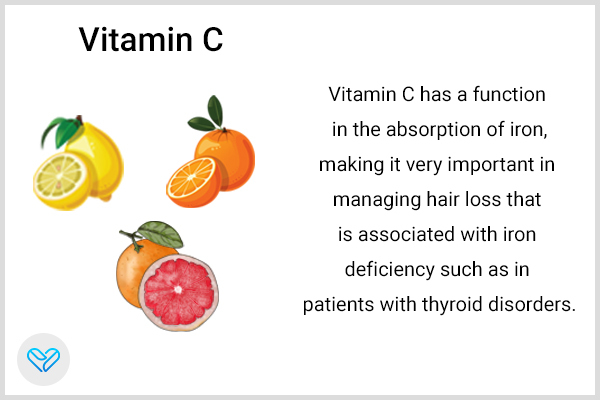
Your body needs vitamin A for many different functions. It’s required for healthy hair, vision, immune system, and cell growth. You can get vitamin A from dietary food sources such as animal products and plants. (4)
According to research, a lack of vitamin A is closely linked with the weakening of the thyroid gland’s structure and function. (6)
On a daily basis, your diet should provide you with adequate vitamin A. For adults, the suggested quantity is roughly 1,300 mcg/day. (4)
You can get vitamin A from dietary sources like fish liver, egg yolk, butter, milk, cheese, and more. (7)
Note: However, remember that taking too much of certain types of vitamin A can do worse than good as it can cause problems, even hair loss. (4)
3. Vitamin E
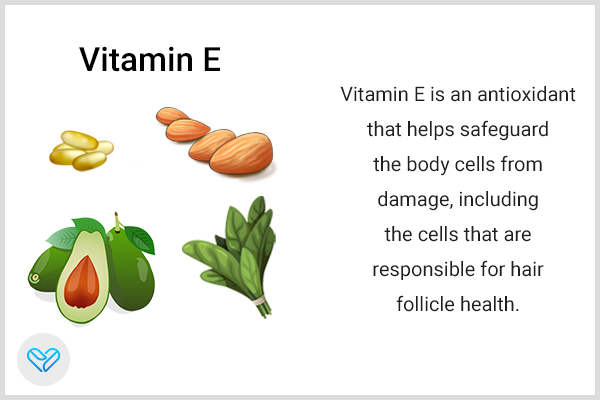
Research has discovered a link between hair loss and something called oxidative stress. People with hair loss very frequently have less defensive substances called antioxidants on their scalp, and their hair strands can get damaged faster and very easily compared to those who have a high antioxidant intake. (8)
Vitamin E is an antioxidant that helps safeguard the body cells from damage, including the cells that are responsible for hair follicle health. In fact, vitamin E has a special type called tocotrienols, which are very potent antioxidants.
A study showed that a patient group that took tocotrienol supplements had 34% more hair by the end of 8 months. The study verified that taking tocotrienol supplements can make your hair grow better. (8)
So, if you’re struggling with thyroid-related hair loss, including some vitamin E, particularly tocotrienols, in your daily diet can help. Rice bran oil, hazelnuts, oats, barley, and maize are all excellent sources of vitamin E. (9)
4. Vitamin B Complex
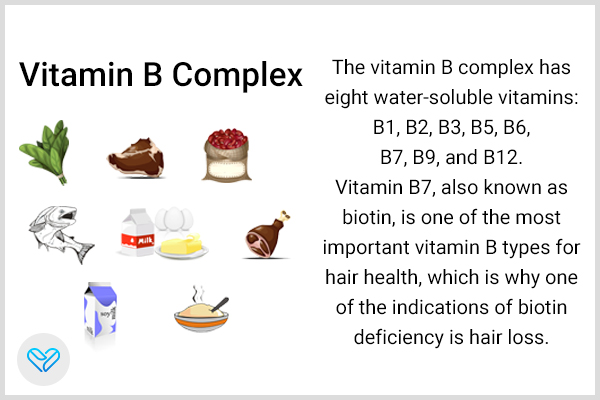
The vitamin B complex has eight water-soluble vitamins: B1, B2, B3, B5, B6, B7, B9, and B12.
Vitamin B7, also known as biotin, is one of the most important vitamin B types for hair health, which is why one of the indications of biotin deficiency is hair loss.
Research has shown that daily consumption of 3–5 mg of biotin can enhance hair growth after 3–4 months in kids. (4) Also, researchers have observed low biotin levels in 38% of patients who complained of hair shedding.
Folate, also known as vitamin B9, is a must for hair health. (4) Moreover, vitamin B12 has been observed to play a role in hair follicle proliferation.
Therefore, researchers have concluded that B vitamins B7, B9, B12, and B6, are essential for promoting hair health and that their deficiency due to thyroid (10)(4) or other issues can lead to hair loss.
You can get sufficient vitamin B from dietary intake of leafy green vegetables, dairy products, beans, and meat. (11)
5. Vitamin C
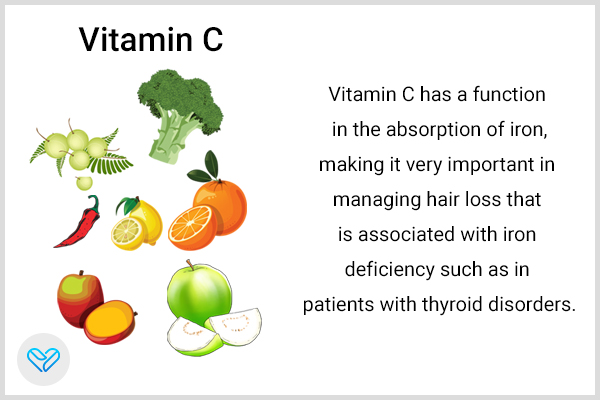
Vitamin C, also known as ascorbic acid, is an essential nutrient known for its antioxidant action.
Also, vitamin C has a function in the absorption of iron, making it very important in managing hair loss that is associated with iron deficiency such as in patients with thyroid disorders. (12)(4)
Therefore, it is important to have sufficient dietary intake of vitamin C if you suffer from thyroid disorders and have vitamin C deficiency. Dietary sources of vitamin C include citrus fruits, which can be great for your health too.
In cases of severe deficiency, supplementation may be required upon the doctor’s advice.
Are Vitamins Enough to Deal with Hair Loss in Thyroid Patients?
It’s important to note that although vitamins can have an incredible part in hair health maintenance, they are not a one-in-all solution.
Managing thyroid-related hair loss calls for a holistic approach, including thyroid hormone management, balanced nutrition, and proper hair care.
Before making any notable changes to your diet or taking vitamin supplementation, it’s advised to confer with a healthcare professional, particularly if you have a thyroid disorder.
Most-Asked Questions
Can vitamins help with hair loss due to thyroid issues?
Yes, certain vitamins can support hair health in thyroid-related hair loss.
Is vitamin D important for thyroid-related hair loss?
Yes, vitamin D plays a role in hair growth.
Are there specific foods rich in vitamins that can help with thyroid hair loss?
Yes, foods such as citrus fruits, eggs, and leafy greens can support hair health.
Can excessive vitamin intake worsen thyroid hair loss?
Taking excessive amounts of certain vitamins can lead to imbalances that might impact hair health.
Is it necessary to take all vitamins for thyroid-related hair loss?
Each vitamin has its benefits, so it’s best to consult a healthcare provider to determine which vitamins are most appropriate for you.
Final Word
Vitamin D, vitamin A, vitamin E, and B complex vitamins may play a role in promoting hair health in cases of thyroid-related hair loss. They should be considered as part of a holistic approach that includes proper thyroid management and a balanced diet.
- Was this article helpful?
- YES, THANKS!NOT REALLY


